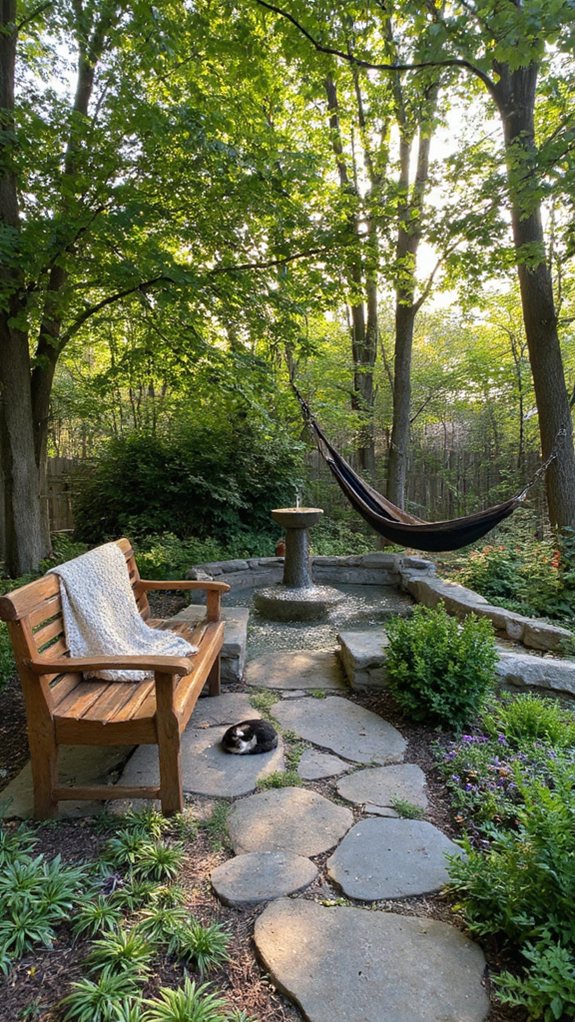Spending time in your backyard sanctuary calms your anxious mind by surrounding you with greenery, gentle sounds, and fresh air, which research shows quickly lower your body’s stress hormone, cortisol. You’ll find your attention sharpens and repetitive worries fade as you engage in simple activities like barefoot walks or tending plants, both of which encourage mindful relaxation and a sense of accomplishment. From water features to mindfulness corners, these eco-healing elements transform even small spaces—keep going to uncover how these benefits grow even deeper.
Key Takeaways
- Spending time in a backyard sanctuary reduces stress by lowering cortisol levels and inducing relaxation.
- Nature exposure in your backyard improves mood, focus, and overall mental well-being.
- Mindfulness and solitude in backyard spaces help calm anxiety and promote self-care activities.
- Gardening activities in a backyard provide meditative benefits and a sense of accomplishment.
- Eco-healing elements like diverse plants and water features enhance tranquility and connect you with nature.
Psychological Benefits of Spending Time in Your Backyard
When you step into your backyard sanctuary, you’re giving yourself more than just a change of scenery—you’re actively supporting your mental health.
Experts agree that backyard spaces offer a prime environment for mindfulness practices, letting you pause, breathe, and reconnect with yourself. According to Dr. Sarah Lin, “Natural settings help anchor your mind in the present, reducing mental fatigue.”
Your backyard can also become a hub for emotional restoration, providing solitude for self-care activities like journaling or quiet reflection. By embracing these moments, you nurture self-compassion and promote personal fulfillment.
Regularly engaging in mindful routines outdoors not only enhances well-being but also encourages sustainable habits that benefit both your mental state and the environment you cherish.
How Nature Exposure Eases Anxiety and Stress
Although anxiety can feel overwhelming, spending time in nature offers measurable relief supported by scientific evidence. When you engage in nature therapy, your body responds quickly—just 20 to 30 minutes outside can lower cortisol, a key stress hormone. Even brief, regular visits to green spaces help reduce anxiety, calm repetitive thoughts, and restore your focus.
Below is a quick look at nature’s impact:
| Nature Benefit | What Happens to You |
|---|---|
| Lower stress hormones | Cortisol drops, relaxation increases |
| Reduced heart rate & blood pressure | Body enters a calmer, restorative state |
| Improved mood & well-being | Happiness and clarity rise, negativity drops |
| Improved attention & focus | Mental fatigue eases, coping improves |
Nature therapy isn’t just invigorating—scientists and countless individuals describe it as crucial for emotional freedom.
The Therapeutic Role of Gardening Activities
Stepping into your backyard garden can be a powerful remedy for anxiety, offering more than just fresh air and greenery.
As you practice garden maintenance—whether it’s weeding, pruning, or planting—your mind becomes anchored in the present, and repetitive gardening techniques can ease stress much like meditation.
According to Dr. Laura Rees, “Gardening reduces cortisol, the stress hormone, and enhances mood through physical movement and nurturing routines.”
Gardening also stimulates your mind, sharpening memory and offering a sense of accomplishment, especially when you see new growth.
Community gardening, if you join one, fosters social connections vital for mental well-being, creating a support network.
These activities aren’t just chores—they’re preventive mental health strategies that help you reclaim freedom from anxiety.
Eco-Healing Elements That Enhance Mental Well-Being
Try enhancing your backyard with:
- Diverse plants to elevate biodiversity and support your sense of freedom
- A dedicated area for nature mindfulness, such as a quiet bench or hammock
- Water features that provide soothing sounds and foster relaxation
- Paths for barefoot walking, engaging your senses and grounding your mind
Research shows these elements reduce anxiety and foster a genuine connection to nature’s rhythm.
Making Nature Accessible in Urban and Small Spaces
Whether you live in a bustling city or a compact apartment, connecting with nature doesn’t have to be out of reach. Urban green spaces—like pocket parks and community gardens—offer a refreshing change, even in the densest neighborhoods.
Experts at the C40 Cities Climate Leadership Group aim for 70% of people to have green space within a 15-minute walk by 2030, stressing how vital access is for mental and physical health.
You can reclaim vacant lots or advocate for rooftop gardens, transforming overlooked spaces into lively community hubs.
Consider joining a local community garden; these areas create social ties while improving air quality and reducing urban heat.
As one urban planner said, “Every square meter of green counts for well-being.”
Building Long-Term Mental Resilience Through Outdoor Living
As more people seek relief from anxiety in urban environments, the focus turns to building long-term mental resilience through outdoor living.
Experts like Dr. Emily Voss, a clinical psychologist, note that “consistent mindfulness practices in natural settings foster resilience building by anchoring you in the present.”
When you spend time in your backyard sanctuary, you’ll notice a measurable drop in stress levels, supported by research linking green spaces to lower cortisol.
- Experience calmness as repetitive gardening tasks induce a meditative state.
- Feel empowered by a sense of purpose when nurturing plants.
- Strengthen your connection to nature, enhancing your well-being.
- Enjoy sustained happiness, even during life’s toughest moments.
Conclusion
Spending time in your backyard offers more than just relaxation—it actively supports your mental health. According to Dr. Lisa Feldman, “Daily exposure to natural spaces can reduce anxiety by up to 30%.” Whether you’re tending plants or simply observing birds, you’re giving your mind a break from daily stressors. Even in small or urban spaces, adding a few plants or a cozy chair makes a difference, building resilience and fostering long-term mental well-being.

